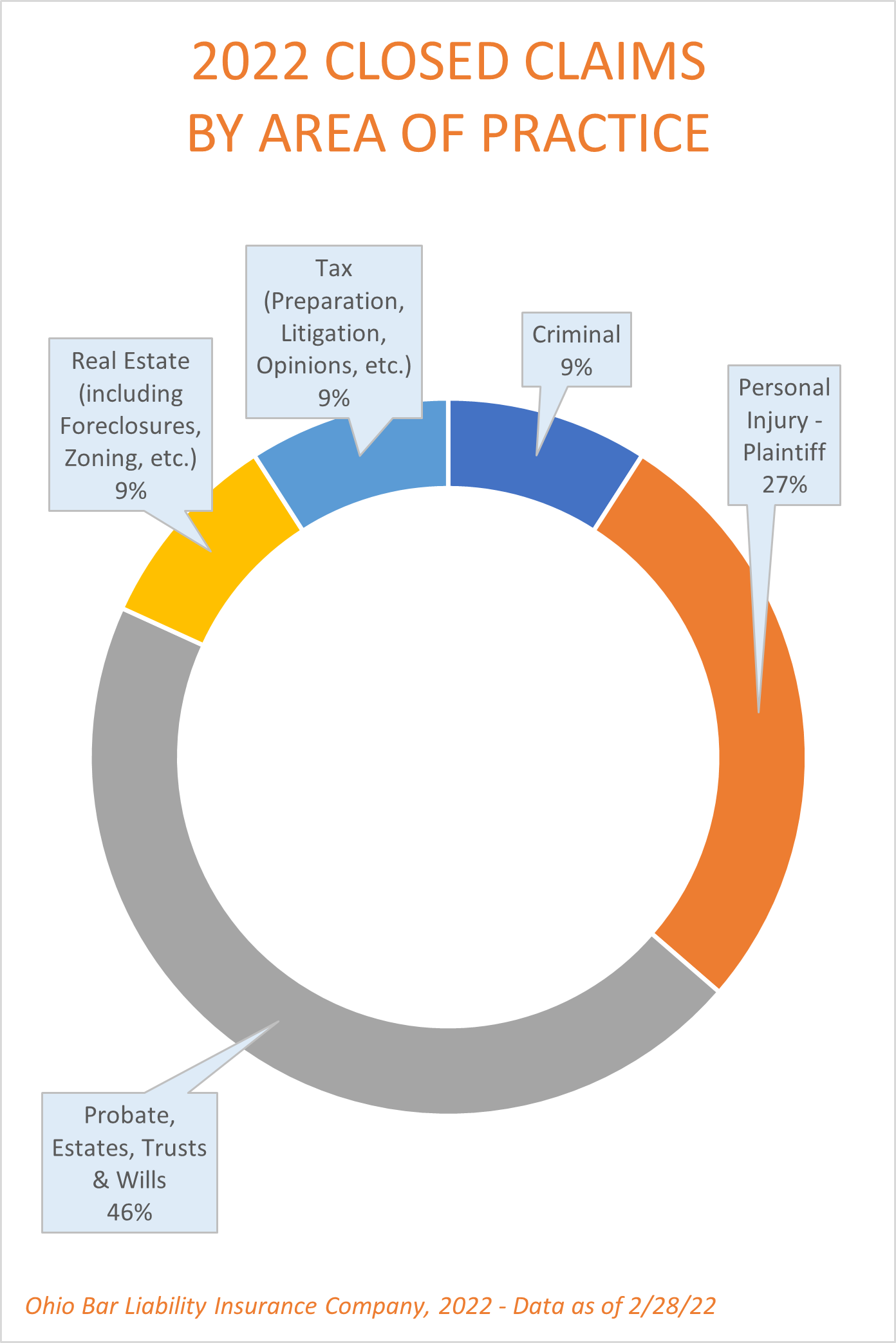< Back
Probate Best Practices: Practical Tips to Avoid Malpractice Claims
Post on April 14th, 2022
Malpractice claims in the practice areas of probate, estates, trusts & wills accounted for 46% of OBLIC closed claims in February 2022.

Probate, estates, trust & wills continue to lead all other practice areas for claims. Avoid becoming part of this statistic by adopting the following Best Practices.
Recognize Conflicts of Interest and Address Them
- Always run a conflicts check before undertaking representation. Don’t ignore conflicts that may develop during representation. Be extremely careful if you undertake representation of one or more clients in the same family.
- Clearly identify who is your client and put it in writing. Do not provide legal advice to others related to the legal matter. In every communication with individuals related to the legal matter who are unrepresented, make clear that you do not represent them and encourage them to seek their own independent legal counsel. A written confirmation of this notice is recommended.
- If you undertake representation of multiple individuals whose interests in the assets of an estate may eventually diverge, explain those potential conflicts of interest, and get the clients’ informed consent to proceed. When the representation is complete, send a file closing letter.
Know the Law and Stay Current on Changes in the Law and Local Rules
- Changes in this area of law often have a profound impact on the interests of the clients. It is imperative for any lawyer practicing in this area to stay aware of those changes and adjust the advice given to clients accordingly.
- Also pay attention to changes to the rules of practice and procedure. Know the local rules for the probate court(s) where you practice and check for amendments. See Ohio Trial Courts & Local Rules.
Use the Correct Probate Form
- Be sure you have the latest uniform Probate Forms.
- Always check that forms will be accepted by local courts and if there are required local court forms.
Avoid Simple Mistakes By Proof-Checking and Calendaring
- Calendar tasks with adequate time to carefully check documents for incorrect calculations, clerical mistakes, and other errors.
- Establish procedures to avoid mistakes such as listing “grantor” for “grantee,” providing an inaccurate property description, or failing to timely file a transfer on death affidavit.
Document Your File
- Always use a fee contract and follow court procedures for fees. Keep your clients informed of the status of the representation. Even if there have been no new developments in the matter, communicate with clients at least monthly to assure them that the matter remains on track.
- Use good intake forms. Ask clients to list by name any individual who may claim an interest in their assets including the names of all children from any relationship at any time in their life. Use an intake form to have clients document their wishes for their estate planning for persons and any entities, including charities. If there is any question of competency, document that determination.
- The best evidence to defend malpractice allegations is documentation created during the representation. Document decisions made by the client and the circumstances under which those decisions were made.
- Good documentation is also critical for lawyers who serve as trustees or guardians of an estate. Keep accurate records of any distributions of assets or expenses incurred to respond to challenges by beneficiaries in the future.
Don’t Dabble
- Don’t get in over your head in a complicated matter. For the general practitioner or new lawyer with little experience in this area, the best practice is to either decline the representation or co-counsel with a more experienced lawyer.
- Consider contacting a Certified Specialist in Estate Planning, Trust & Probate Law. Click for a list of 2022 OSBA Estate Planning, Trust & Probate Law Certified Specialists.
- Or consider becoming a Certified Specialist in Estate Planning, Trust, and Probate Law. See information on Certification of Attorneys as Specialists.
As always, if you have any questions, please contact us. We are here to help.
| Gretchen Mote, Esq Director of Loss Prevention Ohio Bar Liability Insurance Co. Direct: 614-572-0620 Email: [email protected] |
Monica Waller, Esq. Senior Loss Prevention Counsel Ohio Bar Liability Insurance Co. Direct: 614-859-2978 Email: [email protected] |


